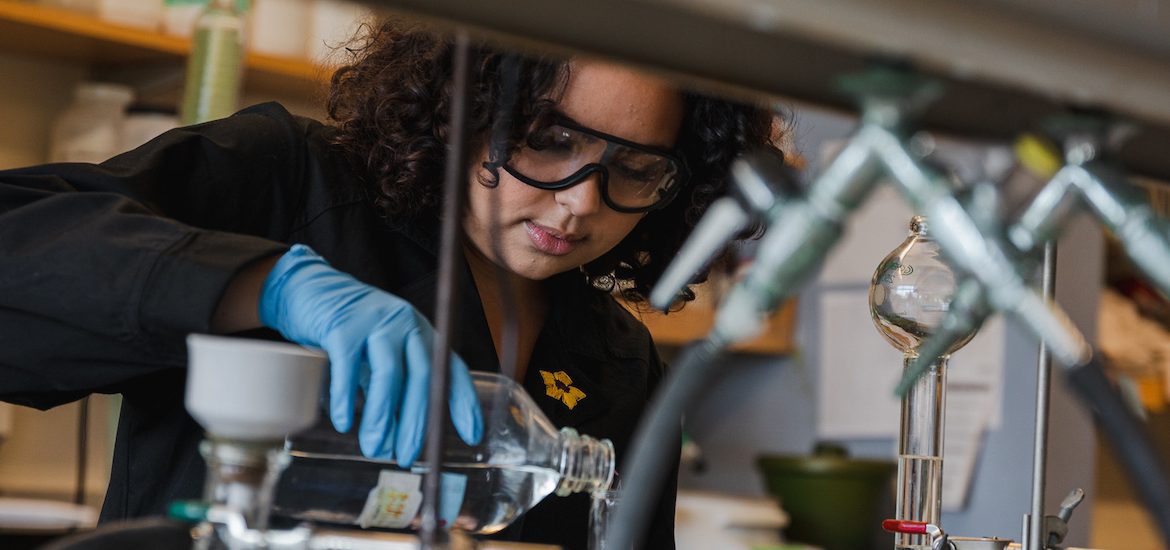Today we highlight Aryana Marquez, a third-year Biological Sciences major with a minor in Chemistry. Marquez discusses her research with organic synthesis of cancer-treating pharmaceuticals, medical school goals, and being a woman of color in STEM.
Why did you choose Rowan?
I applied to 11 schools; I think I got into about seven of them, and most of them were in Philly. Rowan was the closest, and it gave me a better opportunity to be able to move around and do what I had to do. I live about 20 minutes away.
I need a smaller class size, so about 30 students to one professor. I like the idea of getting close with a professor, especially in this field. I have a meeting later with one of my Biochemistry professors because we got so close during the year, she’s going to write me a recommendation letter for medical school. I feel like I always needed that when it comes to schooling because it helps me learn better.
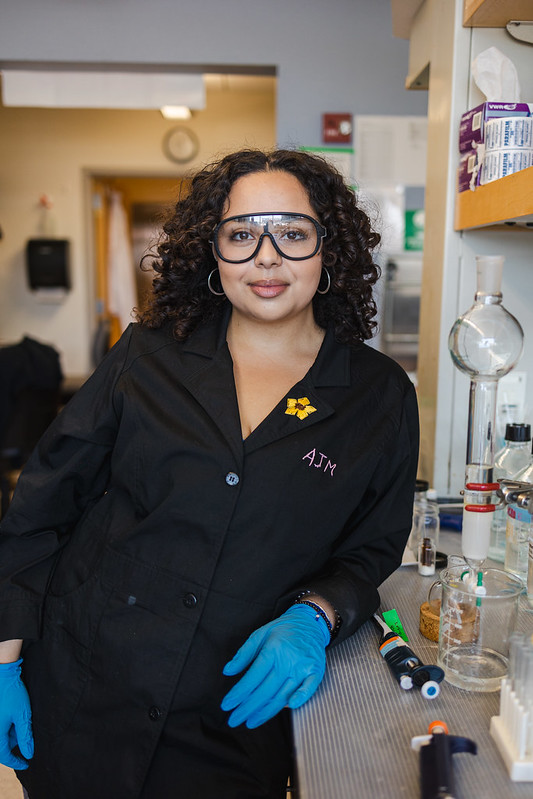
Can you tell me about the Biological Sciences major?
The major here is very diverse, they don’t just focus on human biology. Your first two years are spent taking classes that are very much everywhere. You get ecology, a little bit of evolution, a little bit of cell biology, and then mostly just trying to comprehend what biology is in general and not what it is to a specific field.
How does the Chemistry minor pair with that?
A lot of the Chemistry minor overlaps with the Biology degree. You have to take Chem 1, Chem 2, Organic 1, Organic 2, and in order to get the minor, you just have to take one upper level Chemistry class and one Analytical Chemistry class, which is basically Chemistry III. But because they overlapped and I didn’t want to pursue a Biochemistry degree, I just decided to do the minor instead and take one extra class.
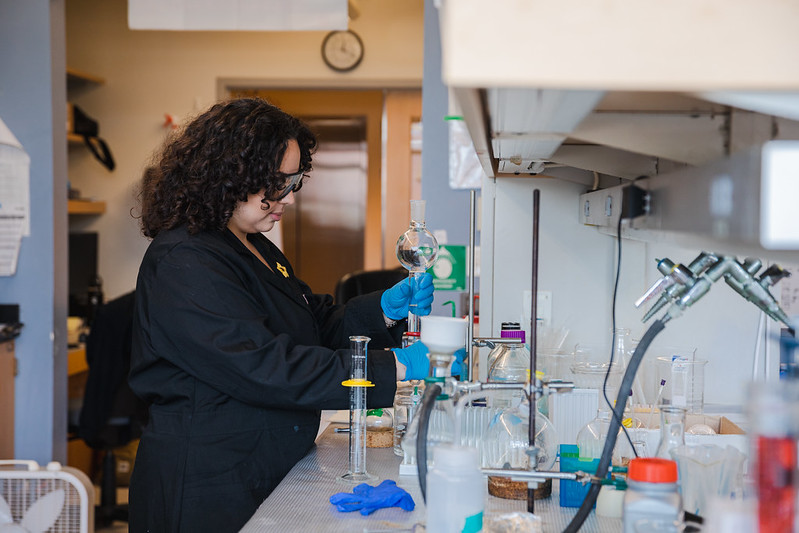
Can you talk a little bit about the research you’ve been working on?
So I’m working on a little bit of cancer research, but it’s not on the biological testing side, it’s more on the organic synthesis side. So I’m making the medicine blindly without always necessarily knowing how it reacts to the body. As long as I get the product that I’m looking for, they send it out, it gets tested, and from there it will get published.
The reason that I chose to do the organic chemistry rather than a human chemistry or a biological science with amino acids or bacteria or things like that is because I just really wanted to get a stronger sense of what organic chemistry is. It wasn’t my favorite subject, but the research itself allowed me to fully understand the gaps that I missed in the classes or in everything else I was doing.
I really appreciate the research because it helps me understand the biology side more once you understand the chemicals and all of the structures and how that works — you’re understanding how it’s able to affect the body in the right way.
Can you talk about the importance of your research and its applicability to real lives?
The importance of doing this and testing them is because it’s new and it’s creating breakthroughs. When it creates breakthroughs in the research that you do and it’s testing well, if it’s able to be reproduced, you can eventually sell it to Big Pharma and make a huge impact on a specific market — huge impact on a specific field.
My work is in anti-cancer drugs, so we’re doing a lot of breast cancer-reducing drugs using organic materials and things that come from nature. So if something were to work out in biological testing right now the way we want it to, it can be a huge breakthrough in the studies of cancer and reduce it on a large scale.
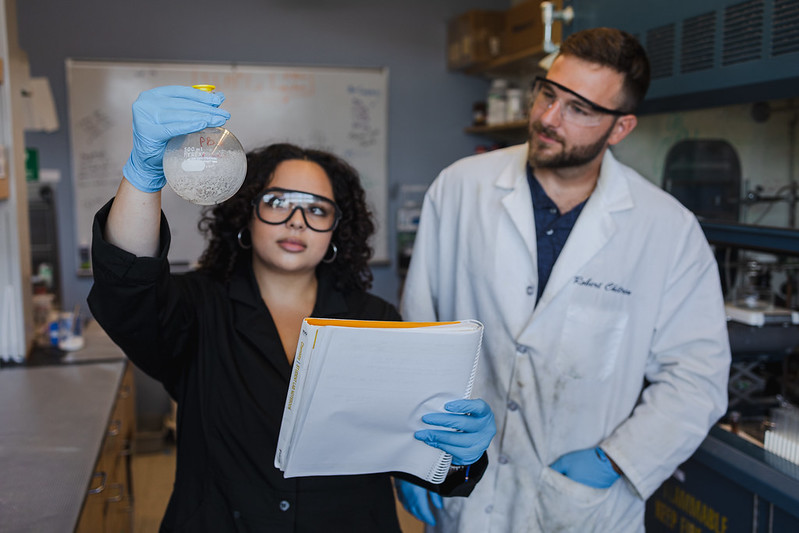
What is the impact of this research?
I don’t mind not having the biggest impact on the research because I know that this is something I can spend three, four years doing and at the end of the day, this piece of research is going to be so small on the bigger scale of everything. Just putting something together myself isn’t going to affect the research on a huge, huge scale. But I like the idea of the research having more of an impact on me because I’m able to learn how to do these things and it’s a very hands-on, problem solving type of thing. If you mess something up, you have to figure out in that moment how to fix what you did and how to go about it moving forward.
I think because of this, when I am a doctor one day, I’ll be using these skills everyday. I think that’s just the impact that it’s making on me. It’s teaching me these huge life lessons, like what you learn in the lab is not just what you’re learning for the lab, they are life lessons, ultimately.
How much of your work in the lab is conducted individually versus a collaborative effort?
It’s a lot of collaboration, mostly because there’s only about three projects being run right now, and they’re all cohesive, so you can do them interchangeably.
If someone is running something, and I have to leave for the day, I can ask him to look over my reaction. We all learn and use the same exact skills, so we all know how to do everything that we need to do in order to proceed. It is very collaborative, so I work with my master’s student — we kind of just work by ourselves, but if we do need the help or need to swap out, we all use the same skills, so it’s easy to be collaborative.
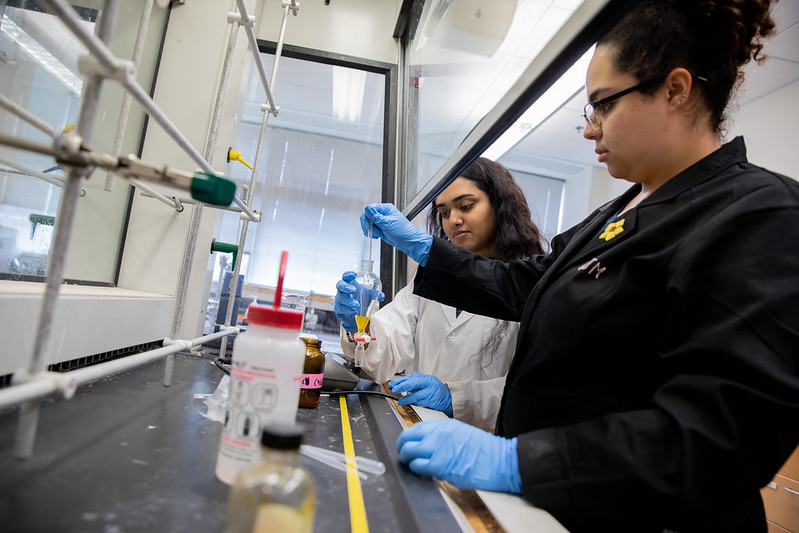
My master’s student, Sabrina, is a Pharmaceutical Chemistry major, and she’s going into her second year now. I really think when it comes to working with someone, you have to know them a little bit. For us, a lot of the time, it’s running reactions, figuring out what’s going on, and bouncing ideas off of each other so that we know how to proceed forward if something doesn’t come off.
Say, we have two products that go in and one product comes out, or two go in and two come out when we only need one, we have to sit and collaborate and use our own ideas to put them together to think of how to work to move forward. We do that really well, we’re very cohesive together, we bounce so many ideas off of each other, so it also comes with a big level of trust. We trust each other to know what we’re doing and not mess things up. Because if there wasn’t that trust, she would never be able to leave and leave me with a product, knowing that I’m the undergraduate student and her work is her work ultimately.
So we do trust each other in that sense, where if she’s out for a week, she tells me what stuff needs to get done. I need to sit down, I need to use my brain, I need to use her thoughts and figure out what she would do in that situation, or how I can go about it. It’s a lot of work, but it’s a lot of fun at the end of the day, and we work very well together. I really like her, she’s my favorite person to have worked with so far.
Can you tell us about the professors you work with?
We work under Professor Subash Jonnalagadda, who’s the head of the Chemistry department. Because we work under him, it’s very hands-off for him — which isn’t because he doesn’t think we can do anything, it’s because he trusts us so much and he knows that we know what we’re doing at the end of the day. If something were to go wrong, we would be able to fix it ourselves. He’s not often here, but if we ever need him we just send an email and he responds fast. A text message always comes back from him first, it always works like that.
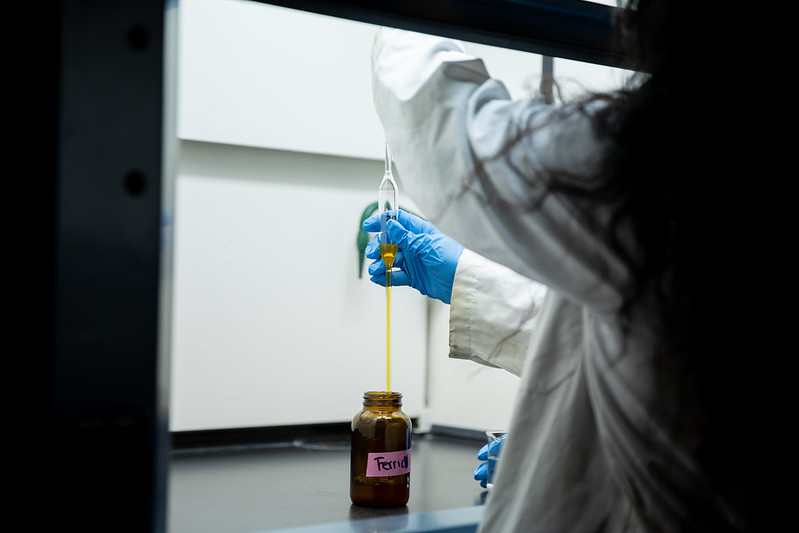
What is it like being a woman in STEM?
I’m one of a few females in my lab, not necessarily the whole program, but in my lab. But I am one of the two women in my entire lab that are working and actively doing research and pursuing these things, and it’s kind of strange!
Especially in the STEM field, it’s a very male-dominated field, so it’s difficult to be able to find your place or to feel like you belong as a woman in this field. Working with men everyday, I always get, not necessarily overlooked, but many times a Ph.D. student will sit next to me just to make sure I’m doing something correct that I’ve done plenty of times before. I know that I’m doing things right, and if I have a problem, I’ll figure it out by myself, and if I really need help, I’ll reach out. But I do feel like a lot of the time women get overlooked in this field as not being as good as men, when in reality, we do the same thing — I just make less money than you do, and that’s it.
I feel like I’m always open to helping other women that want to be here. If you’re a woman, I will 100% take you under my wing and tell you how to go about this so that you’re not getting looked at sideways by a guy.
I really just hope in the future, this will be a more female-populated field. But I think that’s exactly the direction it’s going in. There are more women doing work in this building right now than there have been in past years.
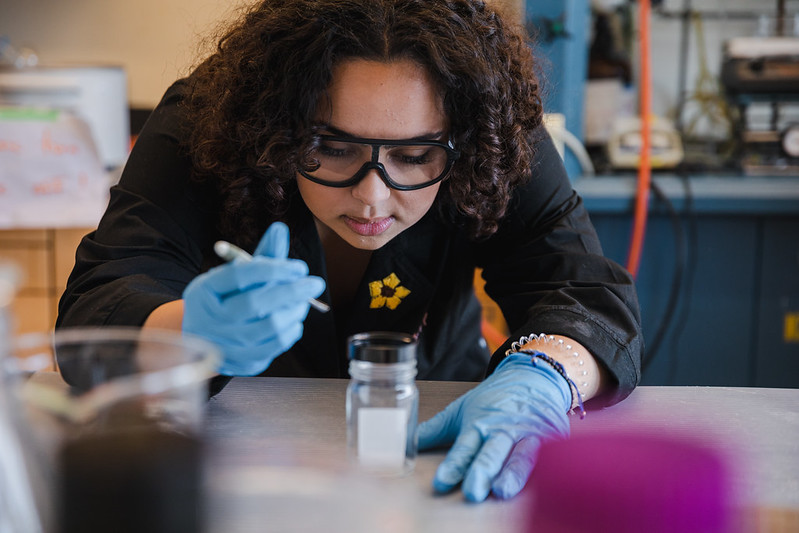
Do you have any tips on balancing work and personal life?
I use all my calendars! I have a chalkboard calendar in my room, my computer calendar, my phone calendar — I use every single one of them. I always make sure to set reminders so I can always be there on time. As long as you understand time management, you can do anything.
See our video with Aryana here:
Like what you see?
Story by:
Skyla Everwine, senior English and writing arts major

